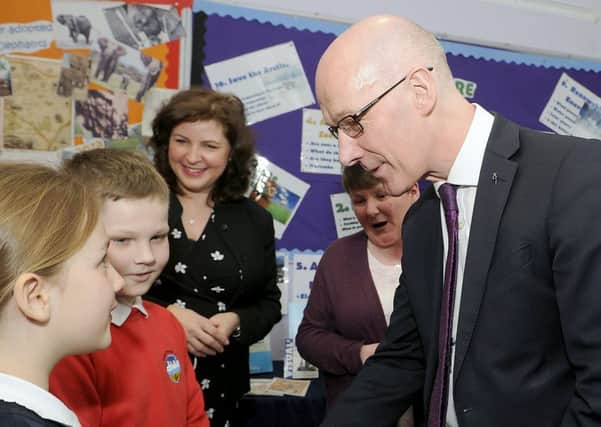Schools reform bill will not be brought in '˜at this time', Swinney confirms


Education Secretary John Swinney insisted by not proceeding with the Education (Scotland) Bill at this time, he was “fast-tracking” changes for teachers and pupils, arguing these could be brought in quicker without changing the law.
But with First Minister Nicola Sturgeon having made closing the attainment gap her top priority, opposition MSPs wasted no time in attacking the government “shambles”.
Advertisement
Hide AdAdvertisement
Hide AdConservative education spokeswoman Liz Smith hit out: “I have only one question - is the cabinet secretary not embarrassed by this complete shambles of a U-turn?”
Labour’s Iain Gray blasted: “The only think being fast-tracked here is the mother of all ministerial climbdowns.”
The announcement the legislation was being put on hold came after the government’s own expert body, the International Council of Education Advisers, urged it to “keep any legislative interventions to a minimum”.
The Bill had been proposed to bring in sweeping reforms to the school system, including the introduction of a new Headteachers’ Charter, giving heads more power over the curriculum, recruitment and budgets.
Initial plans also included disbanding the General Teaching Council of Scotland (GTCS) and transfer its functions to a new Education Workforce Council - although Mr Swinney said he now accepted the “strength of feeling” in the sector to keep the GTCS.
While he said the Scottish Government would not introduce the Bill to Holyrood “at this time”, he said he would return to Holyrood with legislation if “sufficient progress is not made over the next 12 months”.
He stated: “We are fast tracking progress and so we expect progress to be sustained and swift.”
Advertisement
Hide AdAdvertisement
Hide AdThe move was announced as Mr Swinney confirmed £46 million of funding over three years to support education reforms.
The Education Secretary told MSPs at Holyrood: “The Scottish Government and Scotland’s local councils have reached an agreement that endorses and embraces the principles of school empowerment and provides clear commitment to a school and teacher led education system.
“And it does so without the need to wait 18 months for an Education Bill.”
But Ms Smith recalled the First Minister had previously pledged the Bill would bring in “radical change to how our schools are run” and would give headteachers “significant new powers, influence and responsibilities”.
The Conservative MSP accused the government of having broken a “promise to the people of Scotland” by not bringing in the legislation, while leaving “schools with even more uncertainty about their future”.
Meanwhile Mr Gray said the flagship education bill had “sailed off into the sunset” - branding the legislation “unwanted, unnecessary and misguided”.
He added: “The First Minister’s top priority, her sacred obligation, is now reduced to just another last minute, cobbled together joint agreement.”
Scottish Green education spokesman Ross Greer said: “This is a humiliating moment for the deputy first minister, whose proposals have been rejected by teachers, parents and opposition parties in parliament.”
Advertisement
Hide AdAdvertisement
Hide AdLiberal Democrat education spokesman Tavish Scott was also critical saying: “Nicola Sturgeon has repeatedly said education is her number one priority but she couldn’t even be bothered to turn up to see her legislative centrepiece vanish like lines off a classroom smartboard.
“This Bill has faced well deserved criticism from teachers, unions and even the SNP’s own advisers. It should be discarded, not left hanging over the heads of councils.”
Mr Swinney however insisted he had “pursued the policy objective of the government”, saying the agreement with councils “enables us to empower schools faster than can be achieved through legislation”.
As a result he said changes such as the Headteachers’ Charter “should become a reality faster” - with councils and ministers to make developing guidance on this a “matter of priority”.
Larry Flanagan, general secretary of the EIS teaching union, said it welcomed the government’s decision to “pause its Education Bill legislation, and to grant Scottish education the breathing space that teachers have been asking for”.